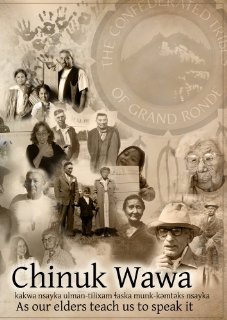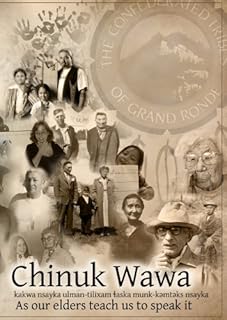3 Reasons to Learn Chinuk Wawa
Chinook Jargon (Chinuk Wawa in the language) is the original lingua-franca of Cascadia, born out of the coming together of different cultures during the fur trade era of the early 1800’s. Part Chinookan, Nuu-chah-nulth, Salish, French, and English, this creole spread from it’s central location of Chinookan Villages here where Portland sits today, all the way down to Northern California, all the way up the coastline to Alaska, and as far inland as Idaho. The language was kept alive over the last hundred years as a heritage language of the Confederated Tribes of Grande Ronde. This language is part of the rich history of human culture here in the Pacific Northwest.
It’s a fun and beautiful language. Wawa has a very different, distinct, and beautiful sound. It’s a fun language to speak! If you grew up in the Northwest, you might know some words in Wawa and don’t even know it: Skookum (strong), “Chuck” (for water), a “Mucky Muck” (pompous person), Tillicum (People/Family), and Tyee (a leader or important person), to name a few.
Here are the top 3 reasons why you should learn how to speak it:
1) It’s respectful to the Native Cultures that still live here, to speak their language.
When you move to a new place, it is an unspoken, respectful tradition that you learn the native language. If you moved to Spain, you would learn Spanish. If you moved to Italy, you would learn Italian. During the 1800’s, if you moved to the NW, you would learn Chinook Jargon. Historically, the jargon was never intended to be a mother tongue, but it is the heritage language of the Confederated Tribes of Grand Ronde today. It is their language. If you live in Portland or the surrounding area, this is the respectful thing to do. It is a way of recognizing that this is their land, their place. It is part of the process of un-doing colonization.
2) It helps to revitalize the language.
As the Native cultures of this region diminished due to the on-going process of colonization, the need to speak the jargon diminished among the “bəstən tilixam” (Non-Natives). Widespread use of the language died out in the late 1800’s and early 1900’s. However, the 26 different Native tribes who were displaced from their land and moved to the reservation at Grand Ronde continue to “wawa” to this day. Through their efforts over the last two decades, there has been a growing revitalization of the language, one that has been kept alive through oral tradition all this time! The more speakers of a language, the stronger it becomes. By joining the language community you help to strengthen the language.
3) Learning different languages allow you to see the world differently.
A language holds within it, the paradigm of the culture that created it. It frames how a person of that culture will see and interact with the world. It is important for people to be able to see the world in many different ways, and in particular, it is important for modern people to be able to understand the ways and world views of traditional cultures. In order for these paradigms of a more wild existence to persist through civilization, we must assist in saving the languages which carry these paradigms. Chinuk Wawa is a pidgin that has been heavily influenced through indo-european languages. In spite of this, there are still sign-posts that allow the speaker to see through a different world view.
Cultural Appropriation
It is important to talk about cultural appropriation when learning particular aspects of Native culture, such as language. To learn to speak Chinuk Wawa is not a form of cultural appropriation, it is what you do with it that can make it negative or positive. The respect you show for Native people by learning their language can quickly shift to disrespect when the language is misused. I would not, for example, teach it to my children as a first language, give myself a Chinuk name, or receive money for teaching a class on wawa (without Native representation and/or approval). Even doing those things can be acceptable in certain circumstances. While I am a fluent speaker and am a member of the language community, I generally give myself a wide birth from appropriative-seeming activities. Be mindful of how you use the language and why you want to learn it.
Become Part of the Language Community
The best way to avoid appropriation is to become part of the language community. Buying the dictionary and trying to teach yourself the language in a vacuum is not a very respectable way to learn the language. If learning the language is a way of creating relationships with Native folks, then you need to be part of the language speaking community. A dictionary is a sad replacement for the vibrance of hearing voices speak the language regularly and fluently. Staying in proximity to the language community is how you help to make the language stronger.
How to Start Learning to Wawa:
1. Every Wednesday in Portland
Every Wednesday (except regular holidays and special Native events days) there is a free language class at the Portland office for the Confederated Tribes of Grand Ronde. The address is 4445 S.W. Barbur Blvd. Portland, OR 97239. Make sure you google it first, because it’s a bit confusing to get to. Class starts at 5:30pm. The instructor is Eric Bernando. He can be reached at chinukwawa@gmail.com.
2. Lane Community College
Lane Community College offers several Chinuk Wawa classes. Read more from the Lane website here: https://crater.lanecc.edu:9010/banp/zwckctlg.P_DispCrseDesc?subj_in=AIL&term_in=201110
3. PSU Study Group
There are student-run Chinuk Wawa classes at Portland State University at the Native American Student Community Center. http://www.ecowiki.pdx.edu/opportunities/view/chinuk-wawa-language-group-psu
4. Buy the Grand Ronde Dictionary!
This dictionary came out recently and is over a decade in-the-works. The most impactful way to order the book if you live in Portland is to go to Powells Books and order it through them. This will help encourage the store to keep it stocked on the shelves. The book is called “Chinuk Wawa: kakwa nsayka ulman-tilixam ɬaska munk-kəmtəks nsayka” (The way our elders teach us to speak it). Otherwise you can order it through amazon.com here. But don’t just buy the dictionary, come to class and join the speaking community!


Thanks for sharing, Peter. This is awesome! I’ve been itching to know where I might start practicing this tongue since I saw videos of you playing “Where are your keys?” in Chinuk Wawa on, I think, a day of PP-ASSC.
Great post. Book can also be ordered thru regional/local bookstores in the Cascadia bioregion and beyond via http://www.indiebound.org